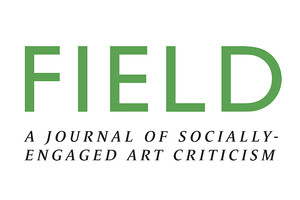Visual Arts Department
9500 Gilman Drive
La Jolla, California 92093
United States
Edited by Greg Sholette
FIELD: A Journal of Socially Engaged Art Criticism, is pleased to announce the launch of a special double issue (FIELD #12/13, Winter and Spring 2019) focusing on new forms of cultural and artistic activism that have emerged in response to the global rise of right-wing populist and authoritarian forms of government. The issue has been guest edited by Greg Sholette, a FIELD board member and a key figure in the area of socially engaged art practice, criticism and scholarship for the past three decades. It features over thirty essays by leading artists, activists, historians, critics and curators who share a commitment to freedom of expression, economic equality, environmental justice, individual identity and mobility, and the expansion of democratic processes. This issue grew out of our ongoing conversations about the ways in which socially engaged art has responded to the changing geo-political landscape in the wake of Trump and Brexit. Of course the repercussions of what we might term ‘neo-authoritarianism’ extend far beyond the specific situations of the U.S. and the U.K., as our contributors convincingly demonstrate. We find manifestations ranging from Recip Erdoğan in Turkey, to the recent election of the “Brazilian Trump” Jair Bolsonaro, to the growing violence of Mohammad Bin Salman in Saudi Arabia, to the rise of Alternative für Deutschland, to Xi Jinping’s increasingly autocratic rule in China. The projects discussed in this issue were created in Bangladesh, South Korea, Poland, Turkey, Serbia, Spain, Italy, Colombia, Mexico, Australia, Russia, the United States, Hungary, China and beyond. In each case our contributors pay careful attention to the specific conditions of both power and resistance operating at each location and in each context. As these studies suggest, domination is not a fixed or static thing, to be analyzed in abstraction. It is a living culture that evolves and modifies itself over time and through the exigencies of historical development and ongoing opposition. What are the particular forms and modalities taken by repressive systems? How do they respond to provocation, assault or subversion? What are the potential parameters of resistance in a given social context? At the same time, as we seek to challenge new forms of authoritarian rule, it is also necessary to understand the underlying continuities, in both modalities of repression and in the tactical and strategic responses to it. Sholette’s issue of FIELD provides an invaluable resource for this process by helping us understand, in a comparative manner, the lessons of resistance in our current moment across a broad range of cultural and political settings. It allows us, as well, to learn from and about each other, opening up the possibility of alliances and exchanges within a diverse network of activists and artists.
Contributors to FIELD issue #12-13 include: Heng-Gil Han, Nikos Papastergiadis, Danielle Wyatt, Bo Zheng, Katatare Prajapati Collective, MTL Collective, Nkule Mabaso, Mriganka Madhukaillya, Erden Kosova, Chto Delat, Oleksiy Radynski, Libertad O. Guerra, Angel ‘Monxo’ López-Santiago, Alberto López Cuenca, Lindsay Nixon, Jeffrey Skoller, Chlöe Bass, Marc James Léger, Dan S. Wang, Nato Thompson, Fredrik Svensk, Karen van den Berg, Emma Mahoney, Kim Charnley, Jimena Andrade, Victoria Argoty, Daniel Castellanos, Camila Cifuentes, Miguel Estupiñán, María Gamarra, Guerthy Gutiérrez, Susana Lyons, Silvia Valderrama, Esthefanny Yague, Nicolás Vargas, André Mesquita, Alan W. Moore, Georgia Kotretsos, Kata Benedek, Ágnes Básthy, Kuba Szreder, Marco Baravalle, Carlos Garrido Castellano, Vanessa Theodoropoulou and Rena Rädle.
FIELD’s next issue (Fall 2019) will move from the global to the local, featuring a series of essays and interviews addressing the interrelationship between art, gentrification and resistance in the Boyle Heights neighborhood of Los Angeles. FIELD can be accessed at: field-journal.com and contacted at: fieldjournal1 [at] gmail.com.



